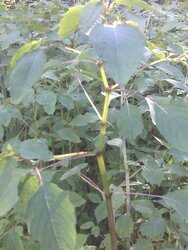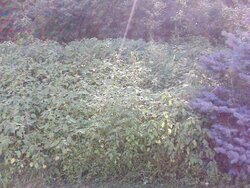I hoping someone can I.D. this invasive plant species and tell me how to wipe it off the planet!
These plants are invading my back yard occupying every square inch of habitable space. the stalks look kinda like bamboo but are very tender and fragile, they are also hollow. If I'm not mistaken they shoot out some Red/Purple berries in the fall.
Help
P.S. Round-Up does nothing.
These plants are invading my back yard occupying every square inch of habitable space. the stalks look kinda like bamboo but are very tender and fragile, they are also hollow. If I'm not mistaken they shoot out some Red/Purple berries in the fall.
Help
P.S. Round-Up does nothing.



